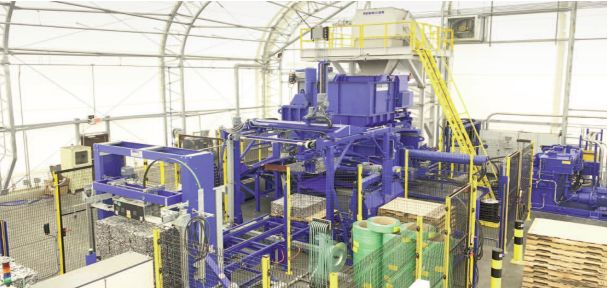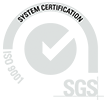Installation of the much anticipated, aluminum separation and briquetting system installed to process the scrap for the closed-loop recycling system at Nissan North America’s Smyrna, Tennessee Stamping facility was scheduled to begin in March 2020. Equipment was loaded on ships several weeks prior to traverse the globe and allow plenty of time for a “go live” date of November 1. The team at Ferrous Processing and Trading Company (FPT) had a well-designed strategic plan to meet this customer expectation.
Then the COVID-19 quarantine shuttered the plant.
Exercising caution, Nissan executives didn’t allow most employees and contractors to return to the plant until July 2020. Additionally, European travel restrictions prevented the overseas experts who designed and built the system from flying into the United States to complete the installation as originally planned. But the delivery date remained the same for the completion.
“Though a Herculean effort, the Ferrous team rolled up their sleeves and got it done,” noted FPT’s Executive Vice President Bill Sulak. “Even with the timeline cut in half, our people still completed the project on-time and under budget.”

The new aluminum separation and briquetting system is the first of its kind in North America, helps reduce CO2 emissions, and promotes the use of recycled materials versus newly mined resources. It’s considered revolutionary because the former closed-loop program was limited to a single grade of aluminum and in a format that was useable by fewer consumers. With the 2.0 system, shredded scrap material is automatically separated, briquetted, and palletized. The separation ensures that the company can return high-quality scrap to its suppliers, who convert the scrap into aluminum alloy sheets and redeliver them to Nissan to produce new parts.
“Each manufacturer has different chemical and physical specifications for their aluminum product. The ingredients must be correct, as consumers have zero tolerance for cross contamination. Separation of the scrap grades is key to reprocessing,” explained Sulak, “The new process, with its automated briquetting and palletizing system, improves Nissan’s program efficiency significantly. Overall processing time is about 75% faster than other systems in place. Plus, with the new format, the scrap is more efficient to transport,” detailed Sulak. “Previously, we were only able to ship the offal, or byproduct, locally. Now we can send it farther – and more furnaces can accept the scrap in briquetted format.”
As impressive as the new process is, the real story is the will and dedication of the FPT team who completed the project against backdrop of unprecedented, historic challenges.
“My faith in the team was absolute. I never doubted their ability to get it done,” Sulak declared. “Kudos go to Dennis Garlough and Don Lyons who both lived onsite, and worked around the clock, until the project was completed. Rachel Gualtieri managed the whole project with dexterity and Tony Benacquisto was the seasoned exec who tied all the pieces together.”
With an eye to how this knowledge can be applied in the future, Sulak hints at exciting projects in the works. “More to come!” he declares.

